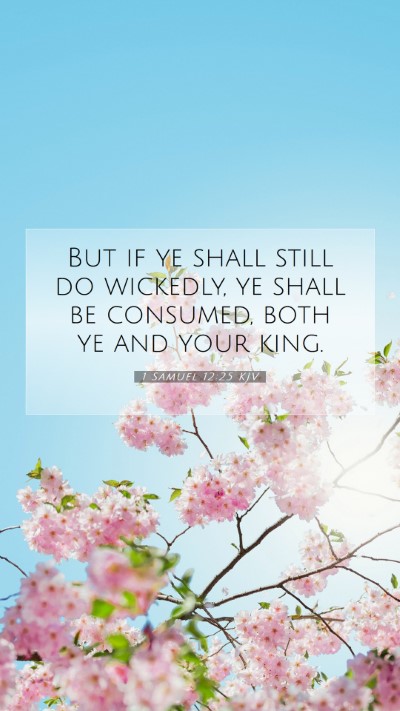Understanding 1 Samuel 12:25
Bible Verse: 1 Samuel 12:25 - "But if ye shall still do wickedly, ye shall be consumed, both ye and your king."
This verse concludes Samuel's address to the Israelites after they demanded a king, serving as a stark warning. The insight provided by various public domain commentaries reflects deeply on the themes of obedience, justice, and the consequences of straying from God's commandments.
Contextual Background
To fully grasp the meaning of this passage, it is vital to understand the historical context. The Israelites desired a king to lead them, similar to other nations, which grieved Samuel as it represented a rejection of God as their sovereign. In this speech, Samuel emphasizes the importance of faithfulness to God and highlights the potential perils of their choice.
Commentary Insights
- Matthew Henry:
Henry underscores the gravity of disobedience, stating that rejecting God’s ways leads to destruction. He notes that the fate of the king is intertwined with the people's actions; both are at risk of divine judgment.
- Albert Barnes:
Barnes elaborates on the term "consumed," interpreting it as both a physical and spiritual annihilation due to sin. He stresses the necessity of maintaining a covenant relationship with God to avoid calamity.
- Adam Clarke:
Clarke examines the moral implications of having a king. He articulates that the people's choices directly influence their leadership, reinforcing that both the king and the nation are accountable for their actions before God.
Thematic Elements
Several key themes emerge from this passage:
- Obedience and Accountability: The Israelites are reminded that their fidelity to God is paramount, and failure to adhere to His commands results in dire consequences.
- Consequences of Sin: The warning about being "consumed" signifies the severe repercussions of turning away from God – not only for individuals but for the entire community.
- The Role of Leadership: The verse shows how the leadership (the king) is linked to the moral standing of the people, suggesting that righteous leadership is a reflection of a righteous populace.
Application for Today
This verse urges modern readers to reflect on their own spiritual journeys. It prompts questions about the leaders we choose and the moral and ethical decisions we make as individuals and a community:
- How do our choices reflect our obedience to God's word?
- In what ways can we ensure that our leaders are held accountable to God’s principles?
- What steps can we take to promote a culture of righteousness within our communities?
Cross References
This verse resonates with several other scriptures that speak of obedience and consequences:
- Deuteronomy 28:1-2: "And it shall come to pass, if thou shalt hearken diligently unto the voice of the LORD thy God..." - illustrates blessings for obedience.
- Proverbs 14:34: "Righteousness exalteth a nation: but sin is a reproach to any people." - underscores the need for ethical living.
- Romans 6:23: "For the wages of sin is death; but the gift of God is eternal life through Jesus Christ our Lord." - highlights the ultimate consequence of sin.
Conclusion
1 Samuel 12:25 serves not only as a historical warning but also as a timeless reminder of the importance of walking in alignment with God's will. By understanding this verse through various interpretations and commentaries, one gains deeper insights into the nature of divine justice and the relationship between God, leaders, and their people.


